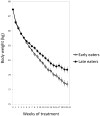Timing of food intake predicts weight loss effectiveness
- PMID: 23357955
- PMCID: PMC3756673
- DOI: 10.1038/ijo.2012.229
Timing of food intake predicts weight loss effectiveness
Erratum in
- Int J Obes (Lond). 2013 Apr;37(4):624
Abstract
Background: There is emerging literature demonstrating a relationship between the timing of feeding and weight regulation in animals. However, whether the timing of food intake influences the success of a weight-loss diet in humans is unknown.
Objective: To evaluate the role of food timing in weight-loss effectiveness in a sample of 420 individuals who followed a 20-week weight-loss treatment.
Methods: Participants (49.5% female subjects; age (mean ± s.d.): 42 ± 11 years; BMI: 31.4 ± 5.4 kg m(-2)) were grouped in early eaters and late eaters, according to the timing of the main meal (lunch in this Mediterranean population). 51% of the subjects were early eaters and 49% were late eaters (lunch time before and after 1500 hours, respectively), energy intake and expenditure, appetite hormones, CLOCK genotype, sleep duration and chronotype were studied.
Results: Late lunch eaters lost less weight and displayed a slower weight-loss rate during the 20 weeks of treatment than early eaters (P=0.002). Surprisingly, energy intake, dietary composition, estimated energy expenditure, appetite hormones and sleep duration was similar between both groups. Nevertheless, late eaters were more evening types, had less energetic breakfasts and skipped breakfast more frequently that early eaters (all; P<0.05). CLOCK rs4580704 single nucleotide polymorphism (SNP) associated with the timing of the main meal (P=0.015) with a higher frequency of minor allele (C) carriers among the late eaters (P=0.041). Neither sleep duration, nor CLOCK SNPs or morning/evening chronotype was independently associated with weight loss (all; P>0.05).
Conclusions: Eating late may influence the success of weight-loss therapy. Novel therapeutic strategies should incorporate not only the caloric intake and macronutrient distribution - as is classically done - but also the timing of food.
Conflict of interest statement
Figures
References
-
- Corbalán MD, Morales EM, Canteras M, Espallardo A, Hernández T, Garaulet M. Effectiveness of cognitive-behavioral therapy based on the Mediterranean diet for the treatment of obesity. Nutrition. 2009;25(7–8):861–9. - PubMed
-
- Teixeira PJ, Silva MN, Coutinho SR, Palmeira AL, Mata J, Vieira PN, et al. Mediators of weight loss and weight loss maintenance in middle-aged women. Obesity (Silver Spring) 2010;18(4):725–35. - PubMed
Publication types
MeSH terms
Substances
Grants and funding
LinkOut - more resources
Full Text Sources
Other Literature Sources
Medical


